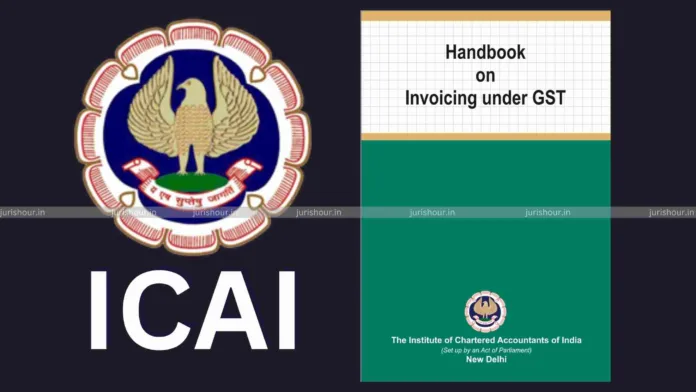The Institute of Chartered Accountants of India (ICAI) has released a revised edition of its flagship publication, Handbook on Invoicing under GST, incorporating all amendments up to May 31, 2025.
The updated handbook, published by ICAI’s GST & Indirect Taxes Committee, aims to provide businesses, professionals, and other stakeholders with a consolidated and practical guide on GST-compliant invoicing.
The release was formally acknowledged by ICAI President CA Charanjot Singh Nanda, who emphasized that invoicing forms the backbone of GST compliance. “Accurate and compliant invoicing is not just a statutory requirement but a key mechanism to claim input tax credit (ITC), ensure transparency, and curb tax evasion,” he noted in the foreword.
Key Highlights of the Revised Handbook
- Comprehensive Coverage – The handbook explains all GST-prescribed documents including tax invoices, bills of supply, debit/credit notes, revised invoices, receipt and refund vouchers, delivery challans, and self-invoices for reverse charge transactions.
- E-Invoicing Updates – Reflecting the phased implementation of e-invoicing, the book details the mandatory compliance for businesses with annual turnover above ₹5 crore (effective August 1, 2023), including provisions on Invoice Reference Numbers (IRN) and QR codes.
- Time Limits & Procedures – The handbook clarifies timeframes for issuing invoices across different scenarios such as goods movement, continuous supply of goods or services, export transactions, and services provided by banks, insurers, NBFCs, and telecom operators.
- Special Cases – Guidance is provided on invoicing for export and SEZ supplies, ISD invoices, banking/financial services, goods transport agencies, and multiplex cinema ticketing.
- Input Tax Credit (ITC) Compliance – The revised edition highlights documentary requirements for availing ITC, emphasizing mandatory fields in invoices and consequences of non-compliance, including penalties under Sections 122 and 132 of the CGST Act.
- Fake Invoice Safeguards – Special attention has been given to clarifications on fake invoicing, penalties for fraudulent ITC claims, and prosecution provisions for severe offences involving tax evasion above ₹5 crore.
- Retention of Records – Registered taxpayers must retain all invoices and related documents for at least 72 months (six years) from the due date of furnishing the annual return, ensuring preparedness for audits and litigations.
ICAI’s Role in GST Ecosystem
Since the introduction of GST in 2017, ICAI has been closely involved in shaping its policies and supporting implementation. The Institute conducts certificate courses, knowledge-sharing sessions, and has issued over 35 technical publications and 53 editions of GST newsletters to build capacity among tax professionals.
“This third revised edition of the handbook is a continuation of our commitment to empower businesses and professionals with clarity and practical guidance on invoicing under GST,” said CA Rajendra Kumar P, Chairman of ICAI’s GST & Indirect Taxes Committee. Vice-Chairman CA Umesh Sharma added that the publication would aid in optimizing financial processes while ensuring compliance.
Why It Matters
For businesses, proper invoicing is not just about avoiding penalties—it ensures rightful credit claims, smooth audits, and reduced litigation risk. With GST compliance increasingly linked to digital platforms like e-invoicing and e-way bills, the handbook is positioned as an essential resource for companies navigating India’s evolving indirect tax regime.
Read More: GSTN Issues Advisory On System Enhancement for Order-Based Refunds

